Vikram Batra: Biography, Wife, Brother, Family, Death
Vikram Batra served as an officer in the Indian Army, during the period of September 9, 1974, to July 7, 1999. Batra won the Param Vir Chakra, the highest military honour given to an Indian after martyrdom in acknowledgment of his contributions during the Kargil War. He was awarded this after being martyred on July 7, 1999, for his engagement in combat with Pakistani troops close to Area Ledge, Point 4875, in the Kargil area of the old Jammu and Kashmir.
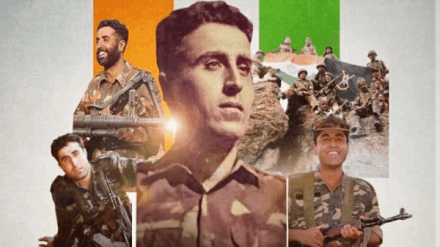
Early Life and Education
On September 9, 1974, Vikram Batra was born in a tiny rural town close to Palampur, Himachal Pradesh. He was the third child of teacher Kamal Kanta Batra and government school principal Girdhari Lal Batra. The second twin boy, Vishal, was older, and they were born with a fourteen-minute age gap. Luv (Vikram) and Kush (Vishal), names that correspond to the identical sons of the Hindu deity Rama, were given to the twins by their mother, who identified herself as a Rama devotee. His early years were spent being schooled by his mother, who also acted as his main instructor. Later, he attended D.A.V. Public School in Palampur, where he finished his middle-grade coursework. As a senior in high school, he studied at Central School in Palampur.
Along with being a stellar student, Batra was an athlete who represented his school at the national Delhi Youth Parliamentary competitions. He participated in sports for his school and college, including table tennis, karate, and others. He had a green belt in karate as well, and he subsequently went to Manali for national-level learning.
He enlisted in the B.Sc. Medical Sciences programme at DAV College in Chandigarh after clearing the Class XII board examinations from Central School in 1992. He joined the Air Wing when he enrolled in the National Cadet Corps (NCC) during his freshman year of college. During the Inter-State NCC Camp, he obtained the award for being the best NCC Air Wing cadet from the Punjab Directorate in the North Zone. At the 35-kilometer-away Pinjore Airfield and Flying Club, where he was chosen, he undertook a 40-day parachute training system. He continued to attend DAV for the next two years as an Army Wing NCC cadet. He also won the presidency of the youth service club at his college.
Later, after fulfilling the standards for the NCC's "C" qualification, he was promoted to Senior Under Officer in his NCC unit. He told his family that he was thinking about enlisting in the Army when he got home in 1994 after being recruited as an NCC cadet and taking part in the Republic Day parade. Both of his maternal grandparents served in the Indian Army. He was recruited to enter the merchant navy in 1995 while still a college student at a shipping company with its headquarters in Hong Kong, but he finally made the choice not to do so because he desired to do "something fantastic, something unusual, which may bring glory to my nation."
He studied at Chandigarh's Punjab University for the MA English programme there. He did this in order to have more time to study for the CDS Exam. He spent the days as a branch manager for a travel agency in Chandigarh and the nights studying.
He cleared the CDS exam in 1996, and the Services Selection Board (SSB) in Allahabad contacted him for an interview.
The Order of Merit placed him among the top 35 candidates.
He received one year's worth of credit (during the academic year 1995–1996) toward an MA in English before leaving the institution to enroll in the Indian Military Academy.
Military Career
The IMA's Manekshaw Battalion welcomed Captain Vikram Batra in June 1996. On December 6, 1997, he received his certificate from the IMA after finishing his nineteen-month study. After that, he was appointed a lieutenant and enlisted in the 13th battalion of the Jammu and Kashmir Rifles. He was transferred to Madhya Pradesh and Jabalpur for an additional month of training.
After undergoing his training, he was deployed to Sopore in the Baramulla region of Jammu and Kashmir. Beginning in March 1998, it took him five months to complete the Young Officer's Course at the infantry school in Mhow, Madhya Pradesh. He received an alpha grade upon finishing and got in touch with his regiment in Jammu and Kashmir.
In January 1999, he was given the task of undergoing a two-month commando training programme in Belgaum, Karnataka. He finished it and got the best result there was—the grade from the instructor.
Dimple Cheema, Batra's best friend and fiancée, was present when he returned to the cafe. When Dimple begged her to use caution in the battle, he responded, "I'll either return after hoisting the Indian flag in triumph or return wrapped in it." I will undoubtedly return, though.
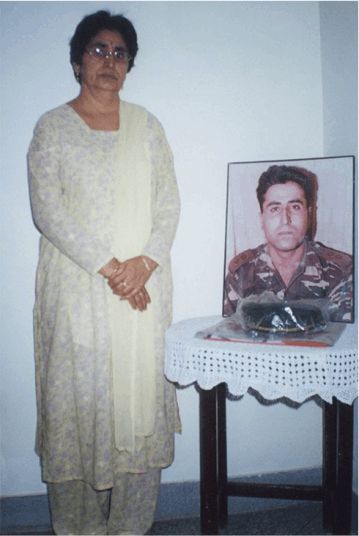
He went back to Sopore once his leave was up and reunited with his regiment. His regimental, the 13 JAK RIF, was ordered to proceed to Shahjahanpur, Uttar Pradesh, having completed its counterterrorism mission in Kashmir while serving with the 192 Mountain Brigade of the Eighth Mountain Division.
Captain Vikram Batra: Kargil War and Martyrdom
After reaching Dallas on June 6, the 56 Mountain Brigade took over command of the 13 JAK RIF unit and instructed it to act as reserves for the second battalion of the Rajputana Rifles (2 RAJ RIF) during the attack on Tololing Mountain.
The 18th Grenadier battalion received the order to capture Tololing. The battalion made four attempts to ascend the summit on May 22 but was ultimately unsuccessful and suffered mass damage. On June 13, 1999, the Rajputana Rifles completed their mission and effectively captured the mountain's summit.
The Capture of Point 5140
The Tololing nullah peak is the tallest in the Tololing range, rising 16,962 feet above sea level. Rocky Knob, the Hump Complex, which contains ten grounds numbered from I to X, and Tololing Mountain are located between point 5140 and the mountain.
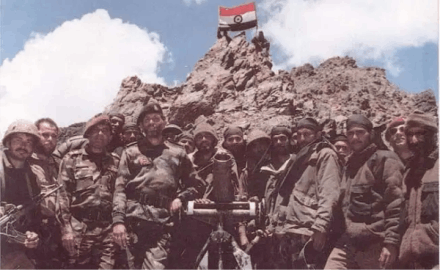
The commanding commander at the moment, Lt. Col. Yogesh Kumar Joshi, planned to strike Point 5140 before dawn to avoid the regiment incurring the greatest number of casualties after the Tololing operation was completed.
From Point 5140, which was led by Lt. Vikram Batra and Sanjeev Singh Jamwal, he instructed B Coy to strike Point 5140 from the east and the south. The commander of that group was D. Coy. Joshi gave the instructions to Jamwal and Batra at the Hump Complex. Each of Jamwal and Batra used their achievement markers, "Oh! " And "Yeh Dil Mange More, yea, yea, yay!" The H-Hour started at 09:30 on June 19, D-Day.
The attack battalions were planned to approach Point 5140 on June 20 after midnight while being shielded by artillery fire. The guns wouldn't fire again until the soldiers were 200 metres away from their objective.
As expected, Pakistani troops immediately came out of their bunkers. When the Indian side of the fight halted firing, they resumed firing with their automatic guns on the advancing soldiers. Jamwal and Batra were at Hump Complex, also called the base, during this time. They asked for the enemy forces to continue to be artillery bombarded until the units were 100 metres away from their targeted target.
By the time the B and D Coys arrived at Point 5140 at 3:15 in the afternoon, the B Coy had already proclaimed victory when Jamwal sent out his radio signal.
Batra approached the hill behind to surprise the adversary and obstruct their retreat path. Batra launched three rockets against the bunkers before engaging the adversary. The enemy's machine guns pinned him and the other climbers as they made their way to the top. As he ascended, Batra threw two explosives towards the machine gun station. Even though he defeated three opponents in close quarters by himself, he suffered critical damage. He rushed to the next enemy position while still hurt and took control of point 5140. His triumph signal was broadcast over the radio at 4:35 a.m.
The operations did not result in any casualties or soldiers dying. Batra received the promotion to Captain following Point 5140. The battalion was instructed to transfer from Dras to Ghurmi for relaxation on June 26. The division moved to the Mushkoh Valley on June 30.
The Capture of Point 4875
The 79 Mountain Brigade took over as the commanding force once the 13 JAK RIF arrived in the Mushkoh Valley. The next objective was to take control of Point 4875. The Pakistani Army could view the Indian Army's artillery positions, army camps, and troop movements since National Highway 1 commanded the desired location, making its capture essential for the Indian Army.
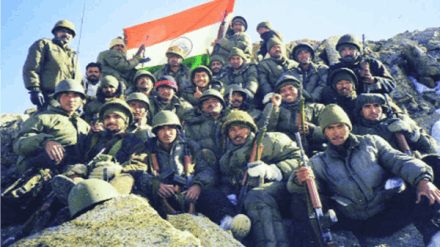
The strategy to take Point 4875 was put into action. A fire support base, 1500 metres from the specified position, was where the 13 JAK RIF was stationed. The Indian Army began bombing enemy positions on Point 4875 on July 4 at 18:00 hours, and they didn't stop fire throughout the night. At 20:30, A and C coys moved closer to the target location while being protected by artillery fire. Batra was sick at the time and was resting in a sleeping bag.
By first light, both soldiers had come up on the target and were 50 metres away. Soldiers started firing at hostile positions at the top of the mountain at about 4:30 a.m. On July 5, at about 10:15 a.m., Joshi fired two Fagot missiles, striking an opposing soldier's base directly and giving pursuing troops protection. The A and C Coys took control of Point 4875 around 13:00, although they were still being attacked by machine guns and artillery fire from Pimple 2 and the terrain north of Point 4875.
At around 22:00, the Pakistani Army opened fire on the A and C companies. The B Coy mentioned the requirement for weapons to enable them to maintain their combat when C Coy reported an intense firefight around 4:45 in the morning. The Indian Army took over Area Flat Top on July 5 following a battle with the invading Army.
Many soldiers begged their superiors for approval to join Batra at the Area Flat Top despite the strict prohibitions. The troops were so inspired by Batra's resolve that they were ready to risk being imprisoned or facing court-martial to join him.
Before departing for the area flat top, Batra and 25 other D Coy members offered prayers at the temple. The commanders at the top received a wireless message informing them of Batra's arrival. The Pakistani Army successfully caught this message. They entered the Indian wireless network to threaten Batra because they feared him. Nonetheless, Batra's rise continued.
Indian soldiers were unaware of the presence of the Pakistani troops on the ledge ahead of the Twin Bump. The Indian forces destroyed the enemy bunkers at Peak 4875 but firing from the ridge pinned them down. While climbing, Batra noticed the enemy's machine gun position firing at the trapped soldiers. He advanced towards the machine gun and destroyed it with a grenade.
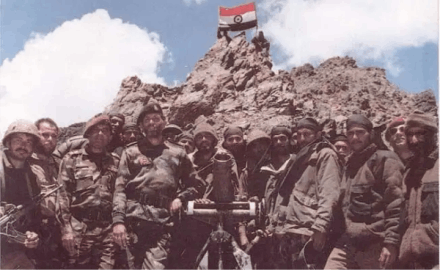
Before dawn on July 7, the Indian soldiers eliminated two additional hostile machine guns. The ledge continued to be used for fire, nevertheless. He received the order to survey the area around 5:30. On the cliff, Batra discovered where the adversary sanagr was. He advanced toward the sangar with other comrades, charging with his AK-47 at tremendous personal risk and while coming under intense hostile fire. Despite receiving several wounds, Batra led the charge with other comrades until they reached the sangar's confined entrance, shocking the foe. He killed five enemy fighters in close-quarters fighting. He also killed four more enemy soldiers who were guarding machine gun positions.
At that moment, Batra became aware that one of his guys had been hit. He continued both of them would save the wounded soldier, turning to face Sub. Raghunath Singh. He told Singh that he would take the head, and Singh would have to take the feet. In the midst of this, he was struck in the head with an RPG fragment and shot in the chest from a close distance by an enemy sniper.
The Citation For The 'Param Vir Chakra' Awarded To Him Reads
The Srinagar-Leh Road, the main supply route to Leh, was fiercely guarded by the invading Army in the Dras Sector. These positions were well-constructed and heavily armed with automatic guns. Captain Vikram Batra, Commander of Delta Company, was given the order to attack position 5140 on June 20, 1999, as part of Operation Vijay. While keeping their position secret, Captain Vikram Batra and his crew circled the feature coming from the east until they were within striking distance. To physically attack the opposing fortifications, the officer restructured his column and inspired his soldiers. The commander, leading his troops from the front, launched a daring attack on the adversaries, engaged them in hand-to-hand combat, and ultimately killed four invaders.
The company of officers was responsible for clearing a narrow feature that blocked the sole access to Point 4875 and had sharp cuts on either side and well-built enemy forces on July 7, 1999, during yet another operation in the vicinity of that point. The officer decided to attack the enemy forces along a sharp slope to accelerate the process. He led the charge, fought the opposition in a bloody hand-to-hand struggle, and executed five enemy troops at close range. Captain Batra suffered severe wounds as a result of this incident. Despite his injuries, he crept toward the enemy and threw explosives at them to clear the area. He took the initiative from the front, rallied his troops, and continued the offensive, accomplishing an almost unachievable military mission in the face of intense enemy fire with complete disregard for personal security. But the officer eventually passed away from his wounds. After seeing this outstanding example of junior leadership, the troops unleashed a furious attack, decimated the opposition, and finally took control of Point 4875.
Thus, in the battle against the enemy, Captain Vikram Batra demonstrated the most outstanding individual courage, junior leadership of the most remarkable calibre, and ultimate sacrifice by the finest Army traditions.
Quotes By Captain Batra
"I will come back without a doubt, whether I arrive covered in the Tricolor (the Indian flag) or after hoisting it."
Don't worry about us; just hope for your safety.
"Durga Mata Ki Jai!" was Captain Batra's battalion's summons to arms. He ended with, "Victory to Goddess Durga!"
A terrorist bullet that was shot at him on his first deployment in Sopore, Jammu and Kashmir, killed the man standing behind him. He told his older sister over the phone, "Didi, I lost my companion. It was intended for me."
Capt. Batra informed his father, Shri G.L. Batra, that he had successfully captured the peak of 5140 meters. His father prompted him to continue speaking because of the obscurity of his voice. I've taken the enemy's station, Daddy, " I said. I'm fine. " When he had responded, his father had said, "Bete, I'm proud of you; may God bless you as you complete your duty there."
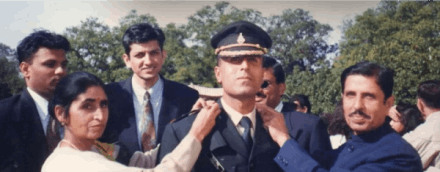
Quotes By Mrs Kamal Kanta, The Mother Of Captain Batra
- "His departure is a lifetime loss for us. However, our son offered his life in exchange for this nation's honour. He gave us pride, even in death.
- "It is uncommon, and our great luck that we were given a kid like him who placed the country first."
- "Our child had conquered three peaks; he had taken the country by storm, and then he was no longer there." However, when God deals you a deadly blow, he gives you the stamina to handle the anguish. Four of Guru Gobind Singh's sons were martyred for the motherland. So there could have been a reason for all of this.